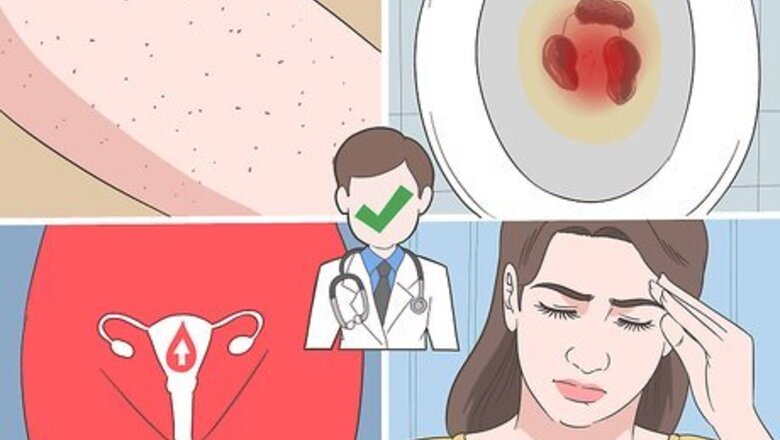
views
Medical Treatments
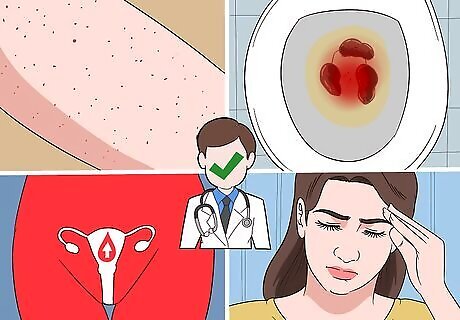
Visit your doctor if you show signs of low platelet count. Thrombocytopenia has a few symptoms that you might notice. The most common ones are easy bruising, small red dots just under the surface of your skin from bleeding, bloody urine or stools, unusually heavy menstrual flows, and fatigue. If you experience these symptoms, see your doctor right away for an exam. Even if you don’t have thrombocytopenia, these symptoms could still indicate a different blood disorder. This is why seeing your doctor right away is important. If you receive any kind of wound and can’t stop the bleeding, this is a medical emergency. Call your local emergency number, like 911, or go to the emergency room right away.
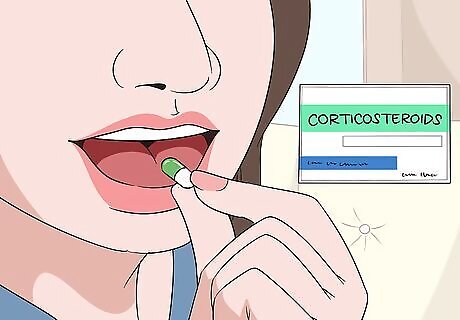
Take corticosteroids to slow platelet destruction. This is the most common first-step treatment for minor cases of thrombocytopenia. Corticosteroids help protect your platelets and keep them alive longer, which should boost your overall levels. Take these medications exactly as your doctor instructs you to for an effective treatment. The doctor may also use steroids if your condition is caused by an immune disorder. The most common corticosteroid side effects are mood swings, increased appetite, fluid retention, high blood pressure, and minor weight gain. These should subside when you finish taking the medicine. Sometimes a person’s platelet levels drop again after they finish taking corticosteroids, so your doctor may try different methods if this happens.
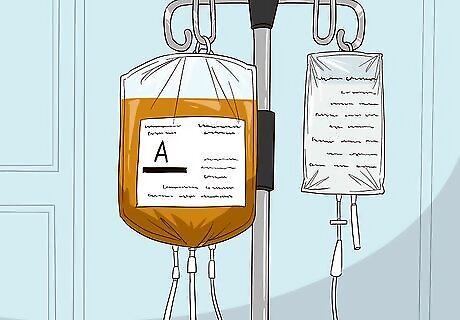
Have a platelet transfusion for more serious cases. This is similar to a blood transfusion, and doctors will use it for more severe cases of thrombocytopenia. During this procedure, usually done in a hospital, the doctor will insert an IV into one of your blood vessels and pump healthy platelets into your body. This will bring your platelet levels back up and should stop the thrombocytopenia from getting worse. Doctors may also choose this option if you have an active bleed, internally or externally. The fresh platelets can help your blood clot and stop the bleeding. If you have an autoimmune disease or other health disorder, you may need multiple transfusions to keep your platelet levels healthy.
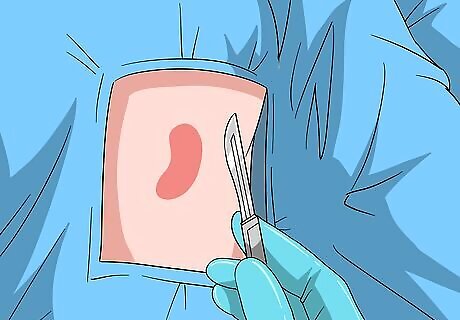
Undergo surgery to remove your spleen if you have ITP. Immune thrombocytopenia (ITP) occurs when your spleen produces too many antibodies that accidentally destroy your own platelets. This is a type of autoimmune disorder. You can live without your spleen, so the main treatment for immune thrombocytopenia is removing it altogether, which is called a splenectomy. Prep for the surgery according to your surgeon’s instructions, and then follow the post-op care directions to prevent any infections. Modern splenectomies use cameras and small instruments, so they’re much less invasive than they used to be. In this case, you’ll probably only be in the hospital for 1 night or even go home the same day. If you had open surgery, you may have to stay in the hospital for 2-6 days. You’ll be more vulnerable to infections after having your spleen removed, so take steps to keep your immunity high. Follow a healthy diet, get plenty of sleep, and exercise regularly to stay healthy.
Ways to Prevent Injuries
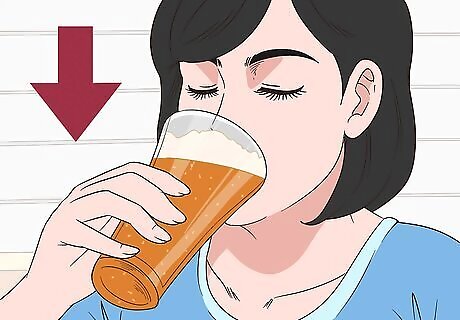
Drink alcohol in moderation. Excessive drinking can damage your liver and decrease your platelet levels. Cut back on your alcohol intake while you're dealing with thrombocytopenia. If you have any liver damage or recurrent thrombocytopenia, then your doctor might suggest that you cut alcohol out of your diet altogether. Follow their instructions to benefit your overall health.
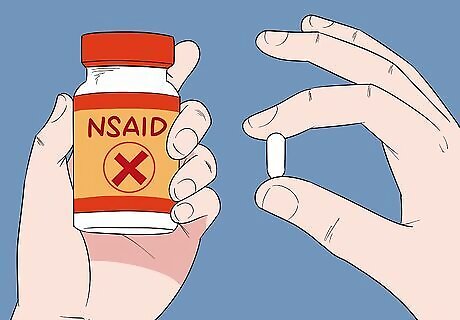
Don't take NSAIDs or other medications that thin your blood. Some medications could reduce your platelet count further and put you at high risk for bleeding. The most common ones are NSAID pain relievers like aspirin and ibuprofen. Ask your doctor if it's safe for you to take these kinds of over-the-counter medicines. Ask your doctor before taking any herbal or dietary supplements as well. Some of these could also thin your blood, like feverfew, ginseng, ginger and ginkgo.
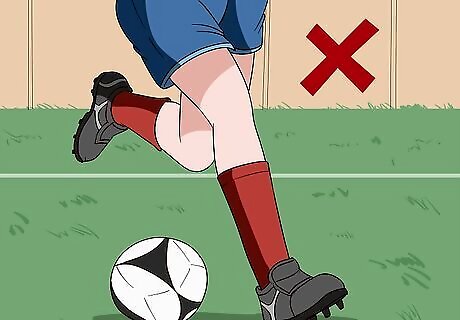
Avoid sports or activities that could cause an injury. Until your thrombocytopenia is under control, you’re at risk for internal or external bleeding from even minor injuries. Avoid contact sports altogether, because these could easily cause injuries. Also be careful when doing any other physical activities, like running. If you slip and hit your head, you could have a serious injury. This might be tough to deal with if you're an active person, but it's important for your safety. You might be able to do some physical activities like biking or running, but ask your doctor if it's safe first. Remember that even if you don’t have an open wound, you could have internal bleeding. If you notice any excessive bruising or take a bad hit during sports, visit your doctor to make sure you don’t have a serious injury.
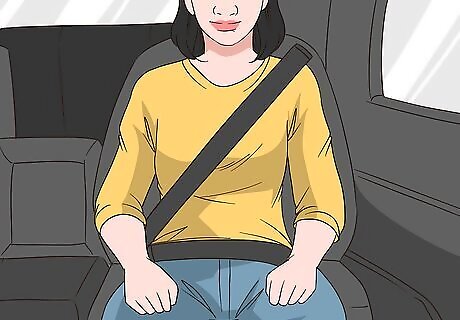
Wear a seatbelt when you’re in a car. Even a minor car accident could cause internal bleeding, so take steps to protect yourself. Always wear a seatbelt whenever you're in a car. If you are in a car accident, even a minor one, visit your doctor for an exam. You could have internal bleeding without realizing it.
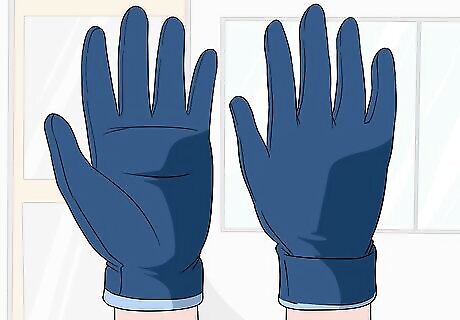
Protect yourself if you’re working with tools or knives. Even minor cuts could bleed excessively if you have thrombocytopenia. Whenever you’re using a knife, scissors, screwdriver, or any other tool that could break your skin, wear thick gloves to prevent cuts.
Eating for Platelet Health
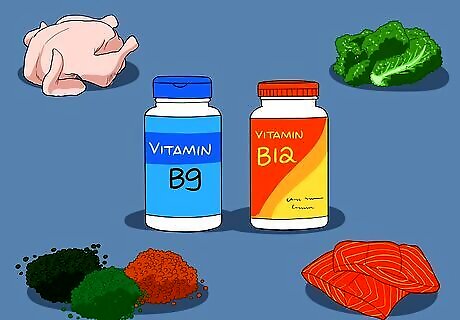
Eat plenty of vitamin B9 and B12. A deficiency of vitamins B9 (folates) and B12 could trigger thrombocytopenia. The official recommendation is to get 200 mcg of B9 each day and 1.5 mcg per day of B12. You can get both nutrients from leafy green vegetables, poultry, red meat, eggs, dairy, legumes, and fish. Vitamin deficiencies are rare as long as you follow a balanced diet, so you probably won’t need to make big dietary changes to get enough. If you do have a vitamin deficiency, it could be a symptom of another health disorder like anemia or an infection. Your doctor will probably want to run other tests if you have a vitamin B deficiency.
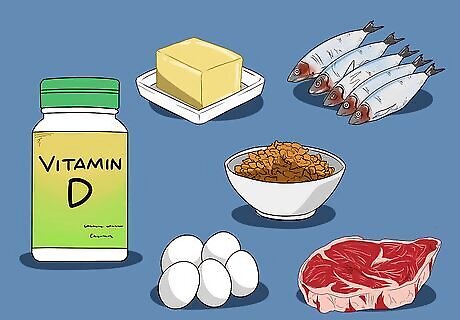
Support your bone marrow with vitamin D. Your bone marrow produces new red blood cells, and vitamin D is important for supporting your marrow health. You need 8.5-10 mcg of vitamin D per day, which you can get from dairy products, red meat, fish, eggs, and fortified foods. Your body also produces vitamin D when you get sunlight, so try spending time outside when you can. Vitamin D deficiencies are common because it isn't in a lot of foods, so your doctor may tell you to take a daily supplement instead.
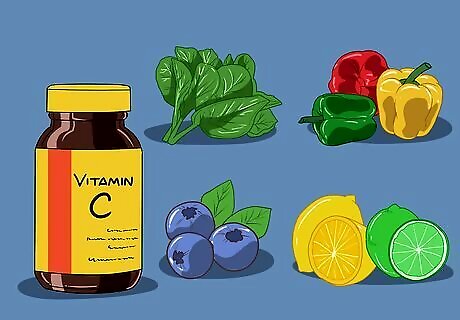
Aid your body's healing ability with vitamin C. Vitamin C doesn't directly boost your platelet count, but it does aid your body's wound-healing ability. This is important with a bleeding disorder like thrombocytopenia, so load up on vitamin C to make sure any cuts you receive heal quickly. Good sources of vitamin C include citrus fruits, bell peppers, leafy green vegetables, and berries. You need about 40 mg per day, which is the amount you'll get from 1 or 2 fruit or vegetable servings.
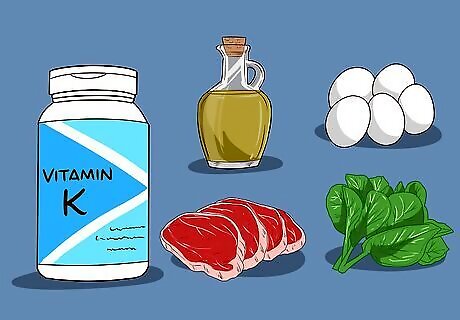
Boost your clotting ability with vitamin K. Vitamin K helps your blood clot properly, which is important if you have a low platelet count. You can get it from leafy green vegetables, vegetable oils, red meat, and eggs. Consume 120-140 mcg per day to support your clotting ability.












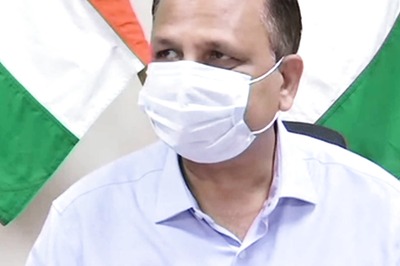







Comments
0 comment